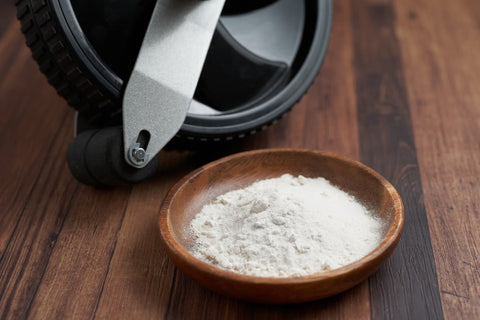Whey protein is considered a staple in the fitness and nutrition industry, popular for its role in supporting muscle growth and overall health. Dedicated athletes consume this supplement as part of their daily regime to boost their amino acid intake and enhance recovery after intense workouts.
But regardless of its widespread popularity, there is a stigma behind the use of protein powders that often leads to confusion and misinformation. This is why we are here. In this guide, let’s discuss a few whey protein myths and the truth behind them.
Myth #1: Whey Protein is Unnatural
Some people believe whey protein contains chemicals and additives that may not be safe for regular consumption.
However, this is just a myth!
Whey protein is derived from cow’s milk. The cow’s milk is curdled for the cheese-making process. When it is being processed, two main protein components - the liquid whey and solid ‘curdly’ casein - are separated from the milk. The curds are used to make cheese while the whey which contains water, protein, lactose, minerals, and a small amount of fat is further processed into a whey protein supplement.
Myth #2: Whey Is Only for Bodybuilders
Protein powder is mostly popular with bodybuilders and athletes who are looking to bulk up, increase strength, and improve recovery time. However, the benefits of whey protein powder extend beyond these.
Whey protein can be beneficial for anyone looking to supplement their diet with additional protein. This includes older adults who need to maintain muscle mass, individuals looking to lose weight while preserving lean muscle, and even those who lead a busy lifestyle and need a quick, nutritious protein source.
Additionally, whey protein may lower blood pressure and help control type-2 diabetes.

Myth #3: Whey Protein Is Not Suitable For Women
There is a fear among the female population that taking whey protein can make their body bulky and manly with broad shoulders and oversized arms. However, due to the low level of testosterone in a woman's body, this is highly unlikely even if she includes intense workouts in her fitness routine.
Whey protein primarily helps in improving the overall fitness of both - men and women - but the extent of muscle growth is largely influenced by the individual’s hormone profiles and specific training regime.
Additionally, whey protein from reputable brands is not reported to cause any hormonal side effects. However, since scientific evidence for this concern is varied, it is suggested to only purchase whey protein from authentic sources. You should also seek guidance from a healthcare professional or registered dietitian before adding whey protein to your diet.
Myth #4: Whey Protein Harms the Kidneys and Liver
High protein intake is believed to harm the kidneys and liver. This is because these organs have to work harder to process the protein and flush out waste byproducts.
However, the impact of whey protein on kidney health is a subject of ongoing research and debate in the scientific community. Some studies suggest that for individuals with healthy kidneys, consuming high amounts of whey protein does not necessarily cause kidney damage.
Nevertheless, it is important to note that excessive consumption of whey protein may contribute to kidney damage, especially when used for an extended period.
High protein diets rich in whey can be a health concern, potentially leading to impaired kidney function, kidney stones, and in severe cases, kidney failure. Therefore, it is advised to consider your unique health and take only the recommended amount of whey protein.
Myth #5: Taking Whey Can Trigger Acne
Strong medical evidence does suggest a link between acne and dairy products. Given that whey protein is also extracted from milk, many people believe it may cause their skin to break out.
And yes, there have been some cases of bodybuilders and athletes experiencing acne and related skin issues.
However, it's important to note that not everyone who takes whey protein will develop acne. Factors such as the skin type, family history, lifestyle, and overall diet also play a critical role in the acne development.
For those concerned about the potential impact of whey protein on their skin, it's recommended to monitor the skin after starting a whey supplement. see a dermatologist if the acne worsens.
Myth #6: Whey Protein Powder Causes Indigestion
Another common misconception is that whey protein powder leads to digestive issues like indigestion, bloating, or discomfort. In reality, whey protein is generally well-tolerated by most people, especially when consumed in recommended amounts.
Digestive discomfort when taking whey protein can be a result of allergy or intolerance to a specific food product, such as lactose since whey is derived from milk.
Additionally, consuming excessive amounts of protein, beyond what the body can comfortably process, can lead to digestive issues.
Myth #7: Protein Supplements Increases Hairfall
There's a common misconception that consuming protein supplements can lead to increased hair fall. However, this is purely a myth. In reality, adequate protein intake is essential for maintaining strong, healthy hair.
And if you are facing hair fall, it may be because of a hormonal issue or a genetic disorder.
Additionally, some whey protein manufacturers include additional ingredients like additives or flavors in their products. An adverse effect to the unnatural elements can cause hormonal disturbance and side effects, resulting in hair loss.
Myth #8: No Need to Workout When Taking Whey Protein
This is probably a fantasy of many but remember: whey protein is not a magic formula. And there is no way you will reach your fitness goals without practising a proactive workout and diet regime along with the consumption of whey protein.
Whey protein is a supplement, not a replacement for a balanced diet and regular exercise. It's designed to support and enhance the results of your workouts, not substitute it.
For effective muscle growth, recovery, and overall health, whey protein should be combined with regular exercise, including strength training and cardiovascular activities.
Myth #9: Whey Protein Substitutes Your Diet
While whey protein is an excellent supplement for boosting protein intake, it can never replace the varied nutrients obtained from a balanced diet. Taking a well-rounded diet that includes fruits, vegetables, grains, and healthy fats along with whey protein supplementation is essential for optimal health and fitness.
Additionally, maintain proper hydration when working out and taking supplements. Water helps the digestion process and absorption of protein, ensuring your body makes the most of the protein powder.
Myth #10: All Whey Protein Products Are the Same
Contrary to popular belief, not all whey protein supplements are created equal. If you are searching for a whey protein powder, you will find the market flooded with a variety of whey protein products, each differing in quality, composition, and additional ingredients.
When looking for a whey protein, consider your unique dietary and fitness requirements. Consult with healthcare professionals when necessary, and choose high-quality whey protein products from reputable brands. With the right approach, whey protein can be a valuable addition to a balanced diet and fitness regime.
Don't let myths deter you from exploring the benefits of whey protein. Trust in the facts, and empower your health and fitness journey with confidence. If you're looking for a reliable, quality whey protein to complement your diet and fitness goals, check out our range of whey protein products today!


